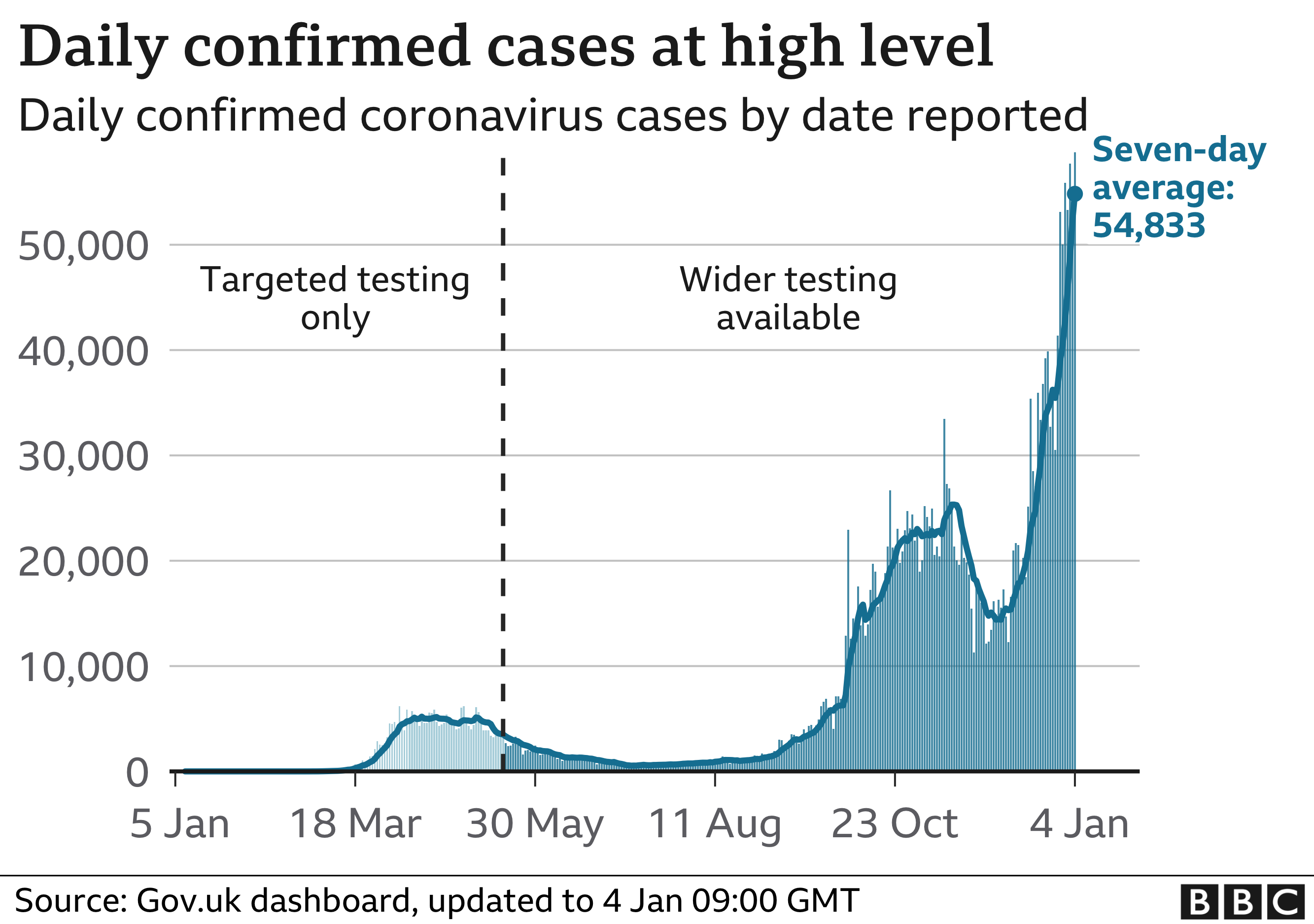(BBC) – Everyone in England must stay at home except for permitted reasons during a new coronavirus lockdown expected to last until mid-February, the PM says.
All schools and colleges will close to most pupils and switch to remote learning from Tuesday.
Boris Johnson urged people to follow the rules immediately amid surging cases and patient numbers.
He said those in the top four priority groups would receive a first vaccine dose by the middle of next month.
Speaking from Downing Street, Mr Johnson said all the new measures would last until at least the middle of February.
He said the weeks ahead would be the “hardest yet” as a new more infectious variant of the virus spreads across the UK.
The PM added that he believed the country was entering “the last phase of the struggle”.
And he reiterated the slogan used earlier in the pandemic, urging people to “stay at home, protect the NHS and save lives”.
Scotland earlier issued a stay-at-home order and joined Wales in closing classrooms for most pupils.
Northern Ireland’s Stormont Executive are also meeting to discuss possible new measures.
On Monday, the UK recorded more than 50,000 new confirmed Covid cases for the seventh day in a row.
A further 58,784 cases and an additional 407 deaths within 28 days of a positive test result were reported, though deaths in Scotland were not recorded.

At-a-glance: New rules in England
- People cannot leave their homes except for certain reasons, like the first lockdown last March
- These include essential medical needs, food shopping, exercise and work for those who cannot do so from home
- All schools and colleges will close to most pupils from Tuesday with remote learning until February half term
- Early years settings such as nurseries will stay open
- End-of-year exams will not take place this summer as normal
- Elsewhere, university students should not return to campuses and will be taught online
- Restaurants can continue to offer delivery for food, but takeaway alcohol will be banned
- Outdoor sports venues – such as golf courses, tennis courts and outside gyms – must close
- Amateur team sports are not allowed, but elite sport such as Premier League football can continue

Those who are clinically extremely vulnerable will be contacted by letter and should now shield once more, Mr Johnson said.
Support and childcare bubbles will continue under the new measures – and people can meet one person from another household for outdoor exercise.
Communal worship and life events like funerals and weddings can continue, subject to limits on attendance.

While Mr Johnson said end-of-year exams would not take place as normal in the summer, he said alternative arrangements would be announced separately.
The government has published a 22-page document outlining the new rules in detail.
The House of Commons has been recalled to allow MPs to vote on the new restrictions on Wednesday.
Labour leader Sir Keir Starmer said his MPs would “support the package of measures”, saying “we’ve all got to pull together now to make this work”.


Once again it is the threat to the NHS that has forced the hand of ministers.
In England there has been a 50% rise in the number of patients in hospital with Covid since Christmas day.
To put that into context, it equates to 18 hospitals being filled.
Currently around three out of 10 beds are occupied by patients with the disease.
In some hospitals it is more than six in 10.
But what is worrying ministers and NHS leaders is that the number is just going to increase.
In the spring it took nearly three weeks after lockdown for hospital cases to peak.
The last six days have seen in excess of 50,000 new infections confirmed each day across the UK – a number of these infections are next week’s hospital admissions.
It is why the UK’s chief medical officers were warning there was a “material risk” of some hospitals being overwhelmed if something did not change.

Mr Johnson spoke after UK chief medical officers recommended the Covid threat level be increased to five – its highest level.
Level five means the NHS may soon be unable to handle a further sustained rise in cases, the medical officers said in a joint statement.
NHS Providers, which represents health service trusts, say hospitals are at a “critical point” and that “immediate and decisive action” is needed.
Announcing tougher measures in Scotland, First Minister Nicola Sturgeon said: “It is no exaggeration to say that I am more concerned about the situation we face now than I have been at any time since March last year.”
The new restrictions in Scotland mean it will be a legal requirement to stay at home except for certain essential purposes, similar to the first lockdown last March. Schools will be closed to pupils until February.
In Wales, all schools and colleges will move to online learning until at least 18 January.
Mr Johnson’s pledge on vaccinations comes after an 82-year-old retired maintenance manager became the first person in the UK to receive the Oxford-AstraZeneca Covid-19 jab.
The new target to vaccinate all those in the top four priority groups with at least one dose of a vaccine by mid-February covers everyone in England over the age of 70 and people of any age who are clinically extremely vulnerable.

